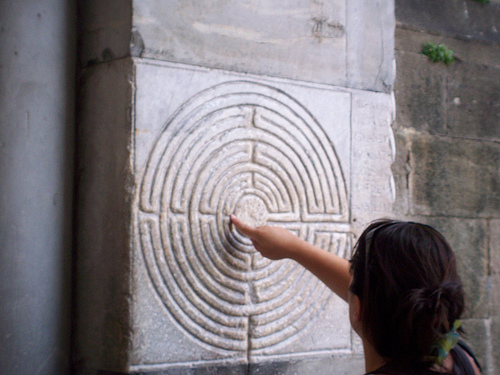We run our website the way we wished the whole internet worked: we provide high quality original content with no ads. We are funded solely by your direct support. Please consider supporting this project.

Problems with the Simple Foreknowledge View
Some have proposed a model of divine foreknowledge which allows them to avoid the dilemma of affirming either that God creates people for the purpose of sending them to hell (Calvinism) or that he creates them without certain knowledge of their fate (open theism). In this alternative view God knows that certain individuals will be damned but cannot on this basis refrain from creating them. This is called “simple foreknowledge,” for it holds that God simply knows what will take place but cannot alter it in the light of this knowledge. The fact that God foreknows what will occur does not increase his control over what occurs.
This view is somewhat different from the classical Arminian position, in which divine foreknowledge was understood to increase God’s control over what transpires without denying human freedom. The original disagreement between Arminius and Calvinistic contemporaries concerned whether God predestines the elect on the basis of his foreknowledge of their faith, as Arminius held, or foreknows the elect on the basis of his having predestined them. The Arminian position presupposes that God acts responsively to his foreknowledge. Thus, he foreknows who will believe and then predestines them.
The simple foreknowledge position denies that God can respond to his foreknowledge in this way, thus avoiding the problem of God creating individuals he knows will go to hell. In this view, God’s act of creating people is not affected by his knowledge of what will become of them. It is as though God possesses “insider information” but must buy and sell as thought he did not. For the same reason, this view does not require divine reason behind every event that occurs. God eternally foreknows each particular evil that will ever take place, but he can do nothing about it.
There are a few problems with this view. First, this and every other version of the Exhaustively Definite Foreknowledge doctrine cannot adequately account for the many passages of Scripture that depict God as facing a partly open future. Indeed, in one respect the simple foreknowledge perspective fares worse than classical Arminianism or Calvinism. Whenever Scripture emphasizes God’s foreknowledge of future events, it is to exalt his sovereign control over what is to come, which is exactly what the open view promotes.
Second, while the simple foreknowledge position avoids some difficulties by denying that God can alter his behavior in response to his knowledge of the future, it invites other difficulties. How can God respond to anything? With all Christians, defenders of simple foreknowledge want to affirm that God sometimes intervenes to bring about events that are more in line with his will. But if God can’t alter the future that he knows is coming, how can he respond to this same future when it becomes present? In the simple foreknowledge view, God must first experience events in the present as though he had no foreknowledge and then foreknow what he experienced and how he responded. In other words, his foreknowledge functions as a sort of “hindsight.”
One might be inclined to pity God if this is his predicament. From all eternity he has seen what is coming—the cosmic war, the horror, the pain, the suffering, the unending plight of the damned. And he can even foresee how he will respond to these tragedies once they occur. But he cannot do anything ahead of time to avoid them. He’s hopelessly locked into an unending vision he can do nothing about.
Third, this understanding of divine foreknowledge is irrelevant. In this view, God’s exhaustive foreknowledge doesn’t make any practical difference for God or for us concerning the flow of history. Everything proceeds as thought God did not possess Exhaustively Definite Foreknowledge. Indeed, if we hold to the pragmatic criterion of truth and insist that a belief must be able to make a conceivable difference in life to be meaningfully affirmed, then simple foreknowledge must be dismissed.
—Adapted from Satan and the Problem of Evil, pages 88-90
Image by berendbotje54 via Flickr
Category: General
Tags: Arminianism, Calvinism, Future, God, Open Theism, Satan and the Problem of Evil
Topics: Open Theism
Related Reading

Isn’t it true that God doesn’t know the future in the open view?
This is the single most common misconception people have about the open view. Open Theists and Classical Theists disagree about the nature of the future, not about how much God knows about it. Both sides grant that God knows everything. He is omniscient. He knows everything there is to know about all of reality, including…

15 Reasons Open Theism is TRUE (a reply to Andrew Wilson)
Article by Dan Kent Recently, Andrew Wilson shared an impressive critique of open theism called: “Responding To Open Theism In Fourteen Words.” Andrew’s article didn’t persuade me, but it did challenge me (seriously!). Below I will respond to each of the words Andrew presents. But first I will add one word of my own (if…

Isn’t the World Unsafe If God Doesn’t Control Everything?
If God isn’t in control of everything, the world feels unsafe. If the future is open and if things can happen outside of God’s will, what guarantee is there that there is a point to a person’s suffering? Maybe it’s all just bad luck. My experience has been that many of those who honestly examine…

Why do you claim that everybody, whether they know it or not, believes that the future is partly open?
Whatever a person may theoretically believe, they act like the future is partly open. For, as a matter of fact, there’s no other way to act. Think about it. Every time we deliberate between options on the way toward making a decision, we assume (and we have to assume) that a) the future consists of…

Process Theology & Open Theism: What’s the Difference?
Question: When ReKnew talks about Open Theism is it a mistake for people to equate it with Process theology, and if so what are the defining differences? I guess I am starting to lean toward Dr. Boyd’s thoughts for all things theologically egg-heady, so I thought I would ask the question. Your ministry has been freeing…

Greg Boyd Chats with Thomas Jay Oord (podcast)
Greg talks with Thomas Jay Oord about what God can and can’t do. Episode 674 http://traffic.libsyn.com/askgregboyd/Episode_0674.mp3
